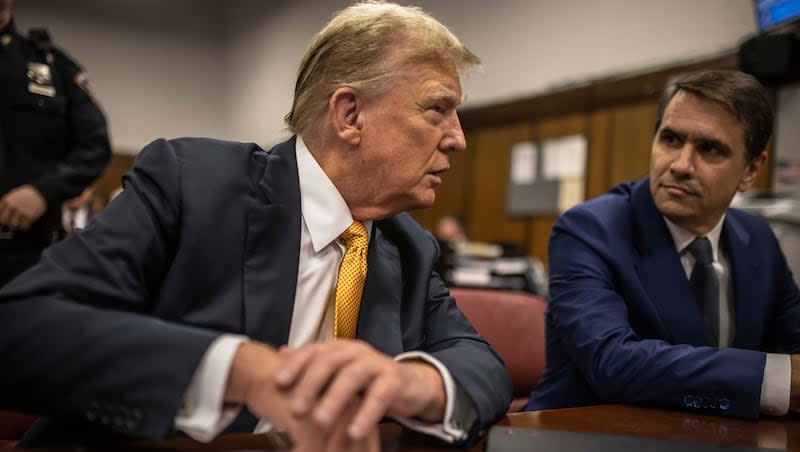Trump defense concludes in criminal trial; closing arguments to begin next week

- Oops!Something went wrong.Please try again later.
- Oops!Something went wrong.Please try again later.
- Oops!Something went wrong.Please try again later.
The defense team in former President Donald Trump’s criminal trial rested its case Tuesday after hearing from its last witness, attorney Robert Costello.
Costello’s questioning began Monday afternoon following testimony from Trump’s former attorney, Michael Cohen, and continued into Tuesday morning. In his testimony, Costello, a former legal adviser to Cohen, told the court that in a phone call in 2018, Cohen admitted to him that Trump “knew nothing” about payments made to adult film actress Stormy Daniels, per The New York Times.
The “hush money” payments are central to the 34-count criminal case against Trump. Manhattan District Attorney Alvin Bragg, who brought the case, is accusing Trump of falsifying business records to cover up a $130,000 payment to Daniels to keep her quiet over an alleged affair they had in 2006. Cohen apparently made the payment leading up to the 2016 presidential election.
The case against Trump is the first time a former president has been criminally charged in American history. In a video posted on his Truth Social account, Trump addressed the crowd outside the courtroom Tuesday, echoing that this case is unlike anything this country has witnessed.
“It’s a kangaroo court. There’s never been anything like this that I’ve ever seen,” Trump said. “New York is really on trial itself. The whole world is watching to see what’s happening.”
Trump did not testify
Although Trump had previously hinted that he would represent himself in the case by taking the stand, he ultimately decided against it.
It is not common for defendants to take the stand in their own cases, but “he might have sought to personally convince a panel of 12 jurors and six alternates that his aim was to protect his family from embarrassment, not bury a story about an alleged sexual encounter damaging to his political prospects,” according to Reuters.
However, Trump’s eldest son, Donald Trump Jr., was present in court supporting his dad on Tuesday, and as he was exiting the courtroom, reporters flooded him with questions about why Trump had decided against testifying before the court.
“How do you justify this insanity? Look at the clowns that they put on there,” Trump Jr. said in a video posted on X. “You don’t subject yourself to that nonsense.”
.@DonaldJTrumpJr outside the courthouse in Manhattan on why his dad didn’t testify: “How do you justify this insanity? Look at the clowns that they put on there. You don't subject yourself to that nonsense.” pic.twitter.com/Ch0exT51Rt
— jake rosen (@JakeMRosen) May 21, 2024
Trump and his supporters have repeatedly accused the New York court system of being biased, the judge of being conflicted and all of the indictments surrounding the presumptive presidential nominee to be politically motivated.
Closing arguments to begin next week
With both parties having rested their case, Judge Juan Merchan released the jury from the courtroom with news that they did not need to return until next Tuesday. Rather than begin closing arguments on Wednesday, Merchan recommended starting after the three-day weekend to avoid breaks in the summation.
After a brief recess, the defense and prosecution returned to court to discuss the instructions Merchan should give the jury. Both parties debated what language should be granted — or omitted — in the judge’s jury instructions. The instructions ultimately explain to the 12 jurors on what they must do to reach a verdict.
“The prosecutors’ proposed instructions, among other things, ask the judge to give the jury what legal experts said was unusual flexibility in determining whether Mr. Trump had a role in the creation of the false records at the center of the charges,” per The New York Times. On the other hand, “Trump’s lawyers asked the judge to remind jurors that Mr. Cohen had served as a lawyer for Mr. Trump while he worked at the Trump Organization. That could suggest to jurors that the former fixer’s role as Mr. Trump’s lawyer should affect the way they view the case as a whole.”
The prosecution also wants members of the jury to be aware that they can convict Trump of three possible crimes: manipulating business records, a tax crime or a federal election law violation.

